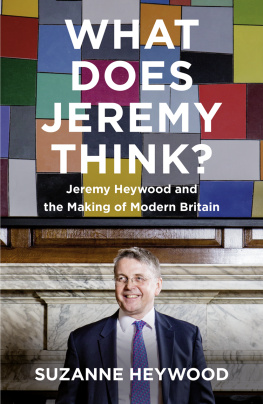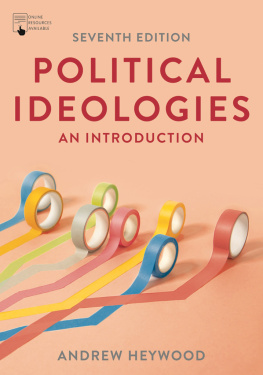Suzanne Heywood - What Does Jeremy Think?
Here you can read online Suzanne Heywood - What Does Jeremy Think? full text of the book (entire story) in english for free. Download pdf and epub, get meaning, cover and reviews about this ebook. year: 2020, publisher: HarperCollins Publishers, genre: Detective and thriller. Description of the work, (preface) as well as reviews are available. Best literature library LitArk.com created for fans of good reading and offers a wide selection of genres:
Romance novel
Science fiction
Adventure
Detective
Science
History
Home and family
Prose
Art
Politics
Computer
Non-fiction
Religion
Business
Children
Humor
Choose a favorite category and find really read worthwhile books. Enjoy immersion in the world of imagination, feel the emotions of the characters or learn something new for yourself, make an fascinating discovery.
- Book:What Does Jeremy Think?
- Author:
- Publisher:HarperCollins Publishers
- Genre:
- Year:2020
- Rating:5 / 5
- Favourites:Add to favourites
- Your mark:
- 100
- 1
- 2
- 3
- 4
- 5
What Does Jeremy Think?: summary, description and annotation
We offer to read an annotation, description, summary or preface (depends on what the author of the book "What Does Jeremy Think?" wrote himself). If you haven't found the necessary information about the book — write in the comments, we will try to find it.
What Does Jeremy Think? — read online for free the complete book (whole text) full work
Below is the text of the book, divided by pages. System saving the place of the last page read, allows you to conveniently read the book "What Does Jeremy Think?" online for free, without having to search again every time where you left off. Put a bookmark, and you can go to the page where you finished reading at any time.
Font size:
Interval:
Bookmark:

William Collins
An imprint of HarperCollinsPublishers
1 London Bridge Street
London SE1 9GF
WilliamCollinsBooks.com
HarperCollinsPublishers
1st Floor, Watermarque Building, Ringsend Road
Dublin 4, Ireland
This eBook first published in Great Britain by William Collins in 2021
Copyright Suzanne Heywood 2021
Suzanne Heywood asserts the moral right to be identified as the author of this work
Cover photograph by Louise Haywood-Schiefer
A catalogue record for this book is available from the British Library
All rights reserved under International and Pan-American Copyright Conventions. By payment of the required fees, you have been granted the non-exclusive, non-transferable right to access and read the text of this e-book on screen. No part of this text may be reproduced, transmitted, down-loaded, decompiled, reverse engineered, or stored in or introduced into any information storage and retrieval system, in any form or by any means, whether electronic or mechanical, now known or hereinafter invented, without the express written permission of HarperCollins.
Source ISBN: 9780008353124
Ebook Edition February 2021 ISBN: 9780008353148
Version: 2021-01-18
For Jeremy,
civil servant, husband and father
Some heroes wear capes mine wore a cardigan.
Jonathan Heywood
It may safely be asserted that, as matters now stand, the Government of the country could not be carried on without the aid of an efficient body of permanent officers, occupying a position duly subordinate to that of the Ministers who are directly responsible to the Crown and to Parliament, yet possessing sufficient independence, character, ability, and experience to be able to advise, assist, and to some extent, influence, those who are from time to time set over them.
Northcote-Trevelyan Report, 1854
Jeremy with his father Peter in 1962
Jeremy driving, 1963
Jeremy with his father Peter, mother Brenda and younger brother Simon
Ralph Butterfield Primary School, Henley
Jeremy on the cricket field
Glossop, 1966
In France with friends
Posing in France
Jeremy in 1983
Jeremy in the Financial Secretarys office
Jeremy recovering from his first lung operation
Working for Norman Lamont in the aftermath of Black Wednesday
In the Chancellors Office
Working for David Mellor
With Norman Lamont in the Chancellors private office
Suzanne and Jeremy on holiday in Hungary
Wedding day
Admiring the new home
Outside Number 10
On the Number 10 stairway
Jeremy with Tony Blair
Gordon and Sarah Brown and the rest of the private office
Meeting with David Cameron and Nick Clegg (Shutterstock)
Jeremy with David Cameron in his Downing Street office (Tom Stoddart Archive/Getty Images)
Receiving the knighthood in 2012 (John Stillwell/WPA Pool/Getty Images)
With the twins in 2003
Jeremy and Jonny in 2002
The family in Santas Grotto
A Cabinet meeting with David Cameron (Neil Hall/AFP/Getty Images)
Welcoming Theresa May to Downing Street in 2016 (Andrew Parsons)
Becoming Baron Heywood of Whitehall, 2018
The family in Malta, 2017
UK Prime Ministers speaking at Jeremys memorial service (Shutterstock)
Seated at the memorial service (Shutterstock)
(All pictures from the authors personal collection unless otherwise stated)
I will always be grateful for the year that I spent talking to Jeremy about this book. And I know Jeremy felt the same way. The last time we spoke about it was in the hospital shortly before he died. By that point, Jeremy was rarely awake, and I was sitting by his side, talking to him, or maybe to myself, and watching him breathe. The news had been full of reports of his retirement as Cabinet Secretary, and I feared would soon be full of news of his death. But for then it was just the two of us, the beeping of the hospital instruments and the rumble of cars on the Marylebone Road.
During one of those afternoons, Jeremy opened his eyes. Your book, he said, his voice faint and raspy though still clear. We have to put our names on it. Jeremy and Suzanne. So all our descendants will know. Theyll be amazed.
They will indeed, I said, though his eyes were closed again. Ill make sure they know. Grandad Jeremy and all you did.
Id begun writing this book a year before, in October 2017. That was six months after Jeremy had been diagnosed with lung cancer, but while he was still working as Cabinet Secretary, trying to help Theresa May deliver Brexit. The process had started with a series of interviews, sitting on the sofa in our childrens playroom where we discussed everything from Black Wednesday to the financial crisis and multiple attempts to reform the public sector.
Its like Rosencrantz and Guildenstern, isnt it? Jeremy said with a smile at the end of one of these sessions.
Id laughed at this, remembering when we had gone to see Tom Stoppards play, which tells the story of those two minor characters from Hamlet, and Jeremy leaning over in the darkness to whisper that it made no sense at all since hed never seen Shakespeares original. But it was also typically modest. Yes, Jeremys story is like Rosencrantz and Guildenstern, who witnessed so much. But Jeremy saw several Hamlets rise and fall. And unlike Rosencrantz and Guildenstern, he was on stage throughout, though determined not to catch the spotlight. Indeed, its partly Jeremys punctiliousness about minimising his visibility that explains why, until now, hes barely left a mark on the endless pages dedicated to those years.
So this is my account of the role that Jeremy played in the making of modern Britain. Its the tale of a man who evolved from being a specialist economist in the outskirts of the Civil Service into someone whom many considered the consummate insider, though he never stopped challenging the system.
Some people have questioned why I have written a biography of a civil servant, and why Jeremy agreed to let me interview him for it. The fundamental reason is that we both believed that this is a story that has historical value and that the Civil Service will be better defended if it is understood than if it hides itself away. Ideally Jeremy would have shared his memories and learnings from almost thirty years of service in interviews and speeches after leaving office as his predecessors have done, perhaps followed by a biography several years later, as has also been done before. However, fate did not give him that option and instead forced us to decide whether to tell his tale in this way or to allow his memories to be lost.
This story emerged from many hours of talking to Jeremy, who found it difficult to escape his biographer. We began by discussing each story in outline so that I understood his perspective on it and I then researched each one in detail. Over the course of writing the book this meant interviewing almost two hundred eyewitnesses, including all the prime ministers whom Jeremy served, together with many of the other ministers, civil servants and special advisers with whom he worked, as well as his business contacts, family and friends. Many interviewees also shared personal papers and diaries and later commented on draft chapters. Jeremy sent me texts giving me his view of what I needed to cover in these interviews, unable to resist a little back-seat driving, and would quiz me on my findings when I returned from each one. His text before my interview with David Cameron is a good example of his interventions and while perhaps not typical of those sent between spouses, it was very useful. It read as follows:
Font size:
Interval:
Bookmark:
Similar books «What Does Jeremy Think?»
Look at similar books to What Does Jeremy Think?. We have selected literature similar in name and meaning in the hope of providing readers with more options to find new, interesting, not yet read works.
Discussion, reviews of the book What Does Jeremy Think? and just readers' own opinions. Leave your comments, write what you think about the work, its meaning or the main characters. Specify what exactly you liked and what you didn't like, and why you think so.









